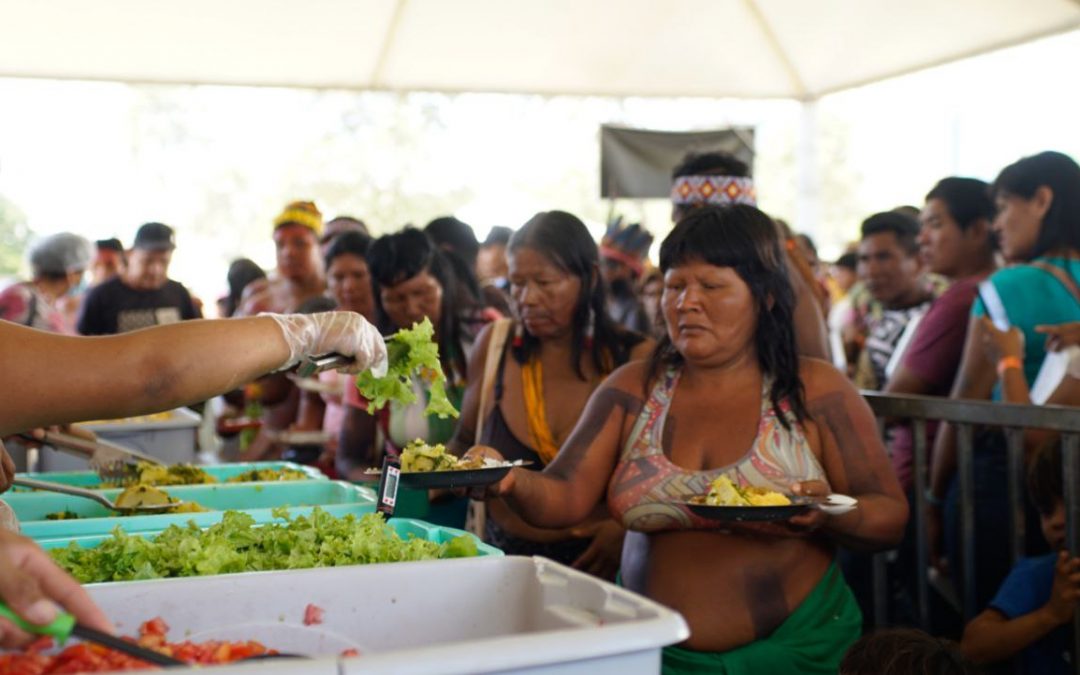By Geanini Hackbardt For Articulação dos Povos Indígenas do Brasil – Apib
Close to the plenary tent of the 18th Free Land Camp, it is possible to hear the noise of pans beating, knives cutting and see the food loads arriving all the time. The heat of the cookers in full steam spreads an aroma of abundant and tasty food. Food here has history and the taste of struggle. It is not just anyone’s mission to satisfy the hunger of the more than 7 thousand Indigenous from 200 different Peoples present in Brasilia up to now. And this challenge fell to the warriors of the Landless Workers’ Movement (MST).
Over 400 kilos of meat, two tons of rice and about two tons of beans are served daily in this kitchen, prepared by the careful hands of 31 men and women from the countryside, with the guidance of 3 nutritionists. Nilma de Jesus Ribeiro, from the Roseli Nunes Settlement, coordinates the team and says that “as MST, we always try to work with organic food. Everything we are doing here at the Indigenous Camp is organic and healthy. We use only natural spices, lots of garlic and onions, because it is the garlic that gives flavour to the food, there is no need to use condiments that have a lot of chemistry. It’s very interesting because we start to learn from each other’s culture”.
This space, however, does not only feed the body. The ATL 2022 kitchen feeds the dream of those who believe in the much needed unity of the peoples to take back Brazil. This is what Dinamam Tuxá, Apoinme’s representative and Apib’s executive coordinator, explains to us. “At this moment the ATL seeks to implement healthier food for our People, with an identity that comes with the struggle. All the food that comes here is the result of a history of resistance, the history of the MST, which is also fighting for its territories. Fighting for their space, for Agrarian Reform. And we have agendas in common. For several years, we have been walking together, but always in a political field. Sometimes we have a joint struggle in practice, but this was diffused within the field of action of the social movements and in the Acampamento Terra Livre we managed to materialize the struggle of the indigenous peoples and the struggle of the MST, represented through their food”.
The food comes from agrarian reform areas of the Federal District and surrounding areas, such as the Oziel Alves, Pequeno Wiliam and Roseli Nunes settlements and from the states of Goiás, Rio Grande do Sul and Minas Gerais, says Adonildo Rodrigues Souza, MST coordinator and camper from the 8 de Março area in Planaltina. For him the work in the kitchen is the practice of solidarity which only exists among the working class. “For us, this space is of great importance, not only for the kitchen to be set up, but for the cultivation of the relationship of solidarity. Despite the little difference we have, it is the causes, the agendas that unite us to fight against this fascist government that every day tries to harm us, workers. It is clear that this government acts to exterminate the poor”, he says.
He explains that the menu was designed to cover the cultural diversity of Brazil and the follow up of professional nutritionists seeks to nurture and strengthen the fight. “How in a country like Brazil, where there is no investment in family farming and agrarian reform, can we get so much food from agriculture, without any policy for this? The ones who feed the Brazilian people are family farmers,” says Adonildo. And Nilma proudly shows the food in stock. “We are offering the best of what we have, cassava, couscous, yams, sweet potatoes, bananas, oranges. The meat is also all organic”.
Dinamam highlights the presence of the MST in this edition of ATL as an intentionality. “We know that this unity is what we need to combat this evil that has been installed in Brazil. This evil of hate, of structural racism, of institutional racism that these two movements have been feeling, especially with this policy that does not recognise family farming, that does not recognise traditional farming, that does not encourage actions aimed at strengthening our traditional and family practices. So, we took the decision to unite to strengthen our production chain, to strengthen this relationship that is more than just political, it is a relationship of struggle. This is a unity for all Brazilian people, in the name of the common good.

